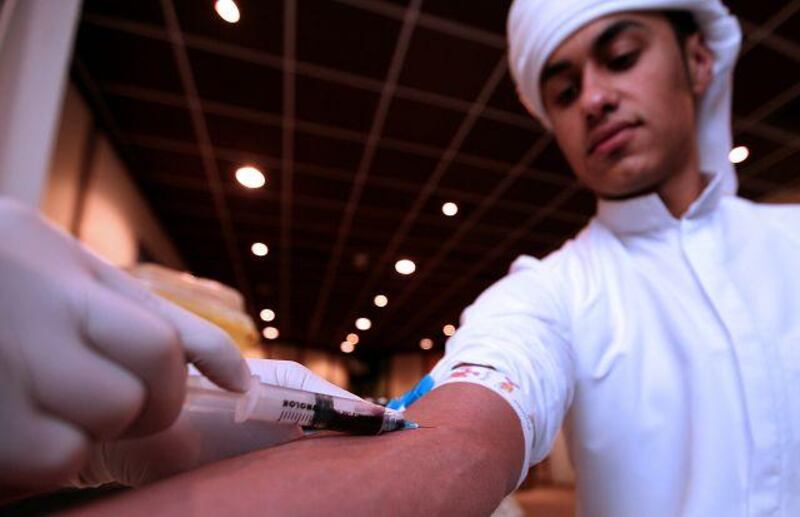ABU DHABI // Children as young as 12 will be shown a film that warns them to consider the risk of genetic disease when choosing a spouse. The 10-minute film, which will be shown in all public and private schools, is part of a national effort to get the message ingrained in children's minds long before they consider marriage. The aim, said Dr Mariam Matar, the founder and executive director of the UAE Genetic Diseases Association, was that by 2012 there would be no babies born infected with thalassaemia.
The way to do that was to convey the severity of the disease before people picked a mate, she said. "We want to look forward to a time in the UAE when, instead of a young woman asking a potential suitor whether he will give her a dowry of Dh150,000 or Dh200,000, she instead asks if he has been screened for thalassaemia and other genetic diseases that could affect their family life," Dr Matar said at yesterday's launch of the campaign.
The association estimates that one in eight Emiratis are carriers of thalassaemia, one of the country's most common genetic disorders, and that at least 1,150 are suffering from the disease. Thalassaemia is a blood disorder that destroys red blood cells. It can lead to anaemia. Although treatment can limit the effects of thalassaemia, its most severe form can kill sufferers before they reach 30.
Treatment is free for Emirati nationals, at a cost to the Government of at least Dh1.2 million (US$320,000) in treatment, counselling, and blood transfusions by the time a sufferer reaches 16. A blood test costs just Dh120. Dr Matar said the message of the campaign was not to tell children not to marry thalassaemia carriers, but to educate them on the consequences. The campaign is a joint effort involving the association, the Marriage Fund and the Abu Dhabi Music and Arts Foundation.
Early reaction to the film had been impressive, said Habiba Mohammed, the assistant director for development projects at the Marriage Fund. She said the first group of pupils to watch the film, in a school in Ajman on Tuesday, had twice asked for it to be rewound and shown again. "It is exciting subject matter to them," Ms Mohammed said. "They understand that this is something they need to know about, before a life partner is chosen for them, either through family connections or blood ties or arranged marriages.
"I got a call from an 18-year-old student who heard about the documentary when his 15-year-old brother told him about it. The 18-year-old was thinking about marrying his cousin and was aware that she had a history of genetic disorders in her family. He wanted to know what are the chances of having a child with thalassaemia, and that's what the film addresses." Although thalassaemia and other genetic diseases are covered by the school curriculum, schools were still glad to have a film that simplified the message and added an element of entertainment, Ms Mohammed said.
"We have also had a brochure produced for us by the Abu Dhabi Music and Arts Foundation that is bilingual, so it can be understood but both Emirati and expatriate students," she said. Hoda al Khamis Kanoo, the founder of the music and arts foundation, said she hoped that the documentary would soon be available online. "This campaign is unique because we are using a cinematic art tool - film - to get the message across," she said. "Through the power of film, we are getting the message across to students that prevention is strong and more effective than treatment."
Dr Maitha Salem al Shamsi, Minister of State and chairwoman of the Marriage Fund, emphasised the importance of educating the young. "Our children are our future and our hope," she said. "When you want to send youth a message, you have to start young, regardless of the message. They are at an impressionable, curious age and their ability to absorb is ideal. To be effective, this is the age we need to educate our future generations.
"In 10 or 15 years, and sometimes much less, these schoolchildren will be getting ready for marriage and having children, so this is not just to tell them about screening tests. "This is about making sure they are educated and warned about the threat of thalassaemia and its effects on the family." @Email:hkhalaf@thenational.ae






